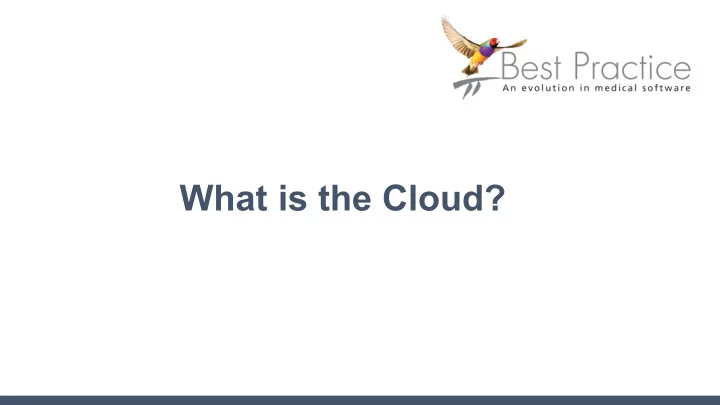

What is the Cloud?
“Simply put, Cloud Computing is the delivery of computing services, including Servers, Storage, Databases, Networking, Software, Analytics and Intelligence – over the Internet (“The Cloud”) to offer faster innovation, flexible resources and economies of scale.” Source: Microsoft 2019 https://azure.microsoft.com/en-au/overview/what-is-cloud-computing/
Infrastructure As A Service (IaaS): Common Platform As A Service Examples of Cloud (PaaS): Services: Software As A Service (SaaS):
Comparing On Premise vs Cloud options On Premise IaaS PaaS SaaS You Manage Applications Applications Applications Applications Others Manage Data Data Data Data Runtime Runtime Runtime Runtime Middleware Middleware Middleware Middleware O/S O/S O/S O/S Virtualization Virtualization Virtualization Virtualization Server Server Server Server Storage Storage Storage Storage Networking Networking Networking Networking
In Infras astr truc uctur ture e as as a a Ser ervic vice e (IaaS IaaS) • Cloud infrastructure services – highly scalable and automated computer resources (servers, network, operating systems and storage in a virtual environment) • Provides remote, outsourced data centre services. • Easy to automate deployment of storage, networking, servers, and processing power • Hardware resources can be based on consumption and purchased as-needed • Highly scalable
Pla Platf tform as as a a Ser ervic vice e (PaaS aaS) • Builds and manages infrastructure that provides a development and deployment environment • Customers purchase the resources they need to develop or customise cloud-based applications. • Provides a secure environment and tools that reduce the amount of coding needed to create anything from simple cloud-based apps to very large enterprise systems.
Sof Software a as a a Se Service ce ( (Sa SaaS) S) • Use software applications over the internet, on demand and typically on a subscription basis. (e.g. Microsoft Office 365) • Accessible over the Internet from any device with web access • Users are not responsible for the hardware or software updates and maintenance.
Ad Advantages: Cost Scalability Performance and Productivity and Reliability Security Speed Elasticity and Data backup, disaster Reduced up-front capacity provides Cloud computing Provided as a self- recovery and cost for more or less services run service and on- business continuity infrastructure. networks of secure demand so time- are improved when computing data centres which consuming onsite IT set up correctly and resources should be regularly management and managed depending on need upgraded and admin is reduced professionally professionally maintained.
Disad Dis advan antag ages: Downtime Lack of Control Cost Potential Vendor Vulnerability to “lock-in” Attack Service outages Users must have a High pay-as-you-go and reduced high level of trust fees may work out What happens if Data centres are a performance are in their provider more expensive you want to potential target inevitable and change cloud and must be unavoidable in service provider? vigilant and locations with poor professionally internet reliability managed.
Le Legislative Con Consideration ons The Privacy Act 1988 (Privacy Act) and the Australian Privacy Principles (APPs) promote and protect the privacy of individuals by regulating how organisations handle personal information. Health and Medical Research Activities utilize the most sensitive types of personal information and therefore additional protections are required. Notifiable Data Breach (NDB) amendments introduced in 2017 obligates entities to report eligible data breaches. (NB failure to comply exposes entities to penalties, including fines up to $1.8M).
1. Understand how using the cloud fits into your overall business strategy 2. Complete a full audit of hardware and software at site to identify what may be suitable to migrate to the cloud 3. Consider what services may need to upgrade to be cloud-ready 4. Check internet speed and assess reliability Tips to 5. When reviewing potential cloud service providers, check: SLAs • think Privacy Policy and Safeguards • Location where Data is stored • about: 6. Understand that the same privacy and security risks still apply in the cloud so this will still require governance. 7. When budgeting, factor in usage and growth changes that may increase today’s running costs. 8. Carefully monitor your cloud usage so as not to get bill shock 9. Make sure you have a robust business continuity plan that allows you to operate in some capacity if you cannot access your cloud systems.
Con Conclusion on: Cloud technology is not a perfect solution to manage patient care and data in every healthcare environment in today’s market. But it does offer significant opportunities in the right situation. Hurdles exist but with proper education, the right framework and good governance, healthcare providers can take advantage of this rapidly growing and useful technology.
Recommend
More recommend